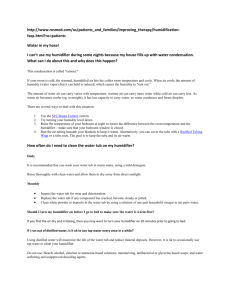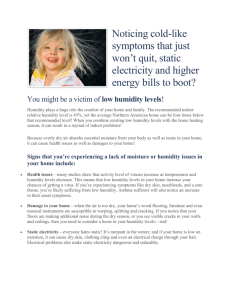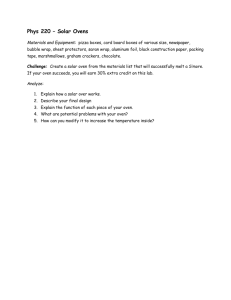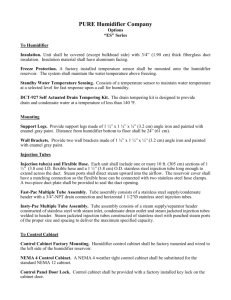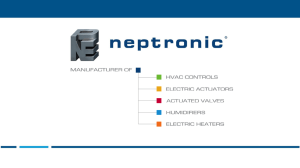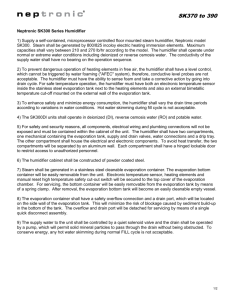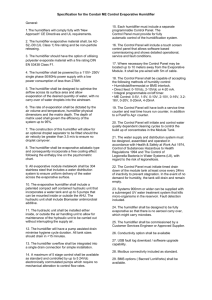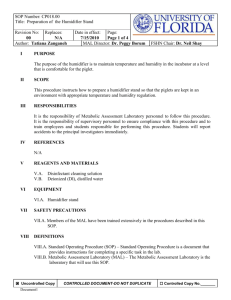Whirlpool Capstone Steam Generation Project
advertisement
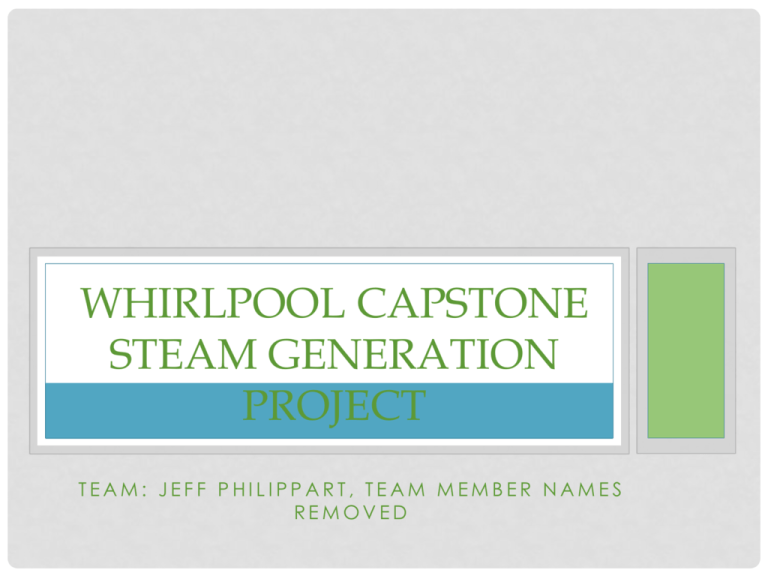
WHIRLPOOL CAPSTONE STEAM GENERATION PROJECT TEAM: JEFF PHILIPPART, TEAM MEMBER NAMES REMOVED INITIAL DESIGN CONCEPTS • Ultrasonic Humidifier • Uses piezoelectric transducer to vibrate water droplets into vapor. • Produces “Cool Mist” immediately with no warm up time. • Boiler • Steam exits boiler after it reaches vaporization point. • Impeller Humidifier • Fan pulls water droplets through diffuser and into atmosphere. • “Invisible Mist” exits fan after water moves through diffuser TESTING METHOD • Gauze attached to thermocouple as wet bulb • The end of the gauze was placed in a measuring cup of water • Second thermocouple used as dry bulb • The convection fan was run continuously PERFORMANCE AT 350° F Relative Humidity versus Time at 350F 3.000 Relative Humidity(%) 2.500 2.000 1.500 no added humidity boiler 1.000 humidifier 0.500 0.000 0 2 4 6 8 Time(mins) 10 12 14 16 • The boiler performed the best at 350 degrees Fahrenheit PERFORMANCE AT 450° F Relative humidity vs. time at 450F 1.200 1.000 Relative Humidity(%) • The humidifier performed the best at 450 degrees Fahrenheit no added humidity 0.800 boiler 0.600 humidifier 0.400 0.200 0.000 0 5 10 time(min) 15 20 FMEA Product Funtion Potentional Failure Mode Severity Potention Root Cause Occurance Rating Corrective Actions 10 Hard Water 5 Customer Instructions: Deionized Water 10 System Flood 4 Use Corrosion Resistant Material Tubing Leak 10 Material Wear 5 Use Stronger Heat Resistant Tubing Cloged Transducer 10 Hard Water 5 Customer Instructions: Deionized Water 10 Material Corrosion 5 Use Corrosion Resistant Material 10 Resevoir Scaling 5 Heating Element in Water Resevoir Tubing Leak 10 Material Wear 5 Use Stronger Heat Resistant Tubing Overflow 10 Customer Error 6 Add Failure Valve Customer Getting Burnt 10 Hot Water Draining 5 Auto Valve Drains When Cooled Tranducer Fail Ultrasonic Humidifier Provide Steam To Oven Cavity Boiler Reserve Leak Steam Boiler Drain Valve Provide Steam To Oven Cavity Drain BOILER CONSTRUCTION CONSIDERATIONS • Recycles no parts from the steam generator used in performance testing. • Water reservoir will maximize the surface area that will be exposed to the external heating plate constructed from welded aluminum . • Heating plate will be constructed from scrap range top element received after the oven breakdown • Electric coils will be removed and set in a non-conductive base plate • Coil path will be milled into the base plate. • Glass plate will be cut to size and attached to the base plate with an adhesive. • Steel brackets will be bent to mount the prototype behind the oven cavity. • Rubber top will be purchased and hole for nozzle drilled • Boiler construction considered “reasonable” and scores middle value of 2 on Pugh matrix. HUMIDIFIER CONSTRUCTION CONSIDERATIONS • Many recycled parts from the ultrasonic humidifier used during the performance testing • Wires on the humidity level switch and led light will be stripped and extended • Switch and LED light will be mounted below stove knobs • Re-designed body will be 3-D printed and contain humidifier components. • Mounting brackets will be made from bent steel to secure body behind oven cavity • Humidifier construction is considered “good” and scores best score of 1 on Pugh matrix COST Humidifier Boiler Boiler Design Cost Humidifier Design Cost part size/type/quantiy part Cost size/type/quantiy Cost transformer 1 $6 nichrome wire 5 ft $5 transducer 1 $4 aluminum body 1 $7 small fan 1 $2 switch 1 $2 3 ft $1 rubber top 1 $3 circuit board 1 $4 water sensor 1 $1 heat resistant tubing 1 $1 led light 1 $2 water resevoir 1 $2 switch 1 $2 drain valve 1 $1 water resevoir 1 $2 water sensor 1 $1 body 1 $5 led light 1 $2 drain valve 1 $1 lock 1 $1 wiring TOTAL $30 TOTAL $25 RELIABILITY Quality of Steam Warm-up Time Quality of Food Control Maintenance Ultrasonic Humidifier Impure water mist could be directly injected into the oven cavity if water in the reservoir is contaminated. Customer Introduction is needed. Water mist is formed as soon as the system is turned on. Users can find out whether the humidity feature is properly working or not immediately. Cold mist injected into the oven cavity could cause a temperature fluctuation which affects the quality of food. Steam Generator As the water goes through the boiling process, there is less possibility of impure steam being injected to the oven cavity. It takes about 12 minutes for boiling water. But the oven also needs time for pre-heating. Comparison Steam generator has less possibility of having contamination issues. As fewer components are required for installing a mist generating unit into the oven, there are less maintenance issues. Components such as a transducer and a fan are easily replaceable. There are also scaling issues. Additional Heating components are required for boiling water. Same as an ultrasonic humidifier, there are scaling issues. (run vinegar through it to clean it) Ultrasonic humidifier requires less effort for maintenance. But both systems has common scaling issues which affects the life time of each system greatly. Ultrasonic humidifier works much faster than steam generator. Ultrasonic humidifier requires no warm up time. As the heated steam is injected into the Ultrasonic humidifier is oven cavity, there are less food quality expected to have a higher issues due to temperature. possibility of food quality issue. But further testing is required to verify it. The flow rate can be easily controlled by The flow rate can be easily controlled Flow rates of both systems can adjusting the vibration speed of the unit. by adjusting the electric current with a be easily controlled by users. Users can easily adjust the flow rate with knob. a knob. PUGH MATRIX Pugh Matrix Design FMEA Humidifier 1 Boiler 3 1-good 2-reasonable 3-poor Cost 3 1 Performance Application Construction Reliability Usability 2 1 1 2 1 2 2 2 2 1 TOTAL 10 11 Water Entrance 3-D DESIGN Vapor Exit Fan Entrance Water Drain Circuit Board Transducer Water Sensor Flow onto Transducer Plunger Path for fan flow Low Water LED Switch Water Entrance Vapor CAVITY Entrance Body Transformer Regulator DESIGN MODIFICATIONS Extended Roof Angled Vapor Exit Vapor Exit Ramp DESIGN MODIFICATIONS Altered Dimensions Floating Magnet LED COMPLETE PROTOTYPE Switch Prototype Water Inlet • Oven front (above) • Prototype and connection mounted on the oven back (right) Prototype Water Reservoir TESTING RESULTS AT 350°F % Moisture by volume vs. time at 350F % Moisture by volume 30.0 20.0 10.0 0.0 0 2 4 6 8 Time(min) 10 12 14 16 TESTING RESULTS AT 400°F % moisture by volume vs. time at 400F 75.0 % Moisture by volume 60.0 45.0 30.0 15.0 0.0 0 2 4 6 8 Time(min) 10 12 14 16 TESTING RESULTS AT 450°F % moisture by volume vs. time at 450F 75.0 % moisture by volume 60.0 45.0 30.0 15.0 0.0 0 2 4 6 8 Time(min) 10 12 14 16 BREAD TESTING METHOD • Oven pre-heated to 350 °F • Thermocouple placed approximately 2 inches into dough • Desired Thermocouple reading of 93° C (200 °F) BREAD TESTING RESULTS With Prototype Normal Oven Conditions MODIFICATIONS AND SUGGESTIONS FOR FUTURE IMPROVEMENTS Product Funtion Potentional Failure Mode Tranducer Fail Humidifier Prototype Provide Steam To Oven Cavity Tubing Leak Cloged Transducer Severity Potention Root Cause Occurance Rating Corrective Actions 10 Hard Water 5 Customer Instructions: Deionized Water 10 System Flood 4 Use Corrosion Resistant Material 10 Material Wear 5 Use Stronger Heat Resistant Tubing 10 Hard Water 5 Customer Instructions: Deionized Water 10 Material Corrosion 5 Use Corrosion Resistant Material • Design permanent water reservoir and water inlet • CNC Machine components from heat resistant plastic • Design smaller fan and scale down body size to accommodate limited space at oven back • A larger piezoelectric plate could increase the water vapor production • Add required circuitry to central board to eliminate humidifier board, transformer, and regulator • Move LED and switch for better physical appearance
